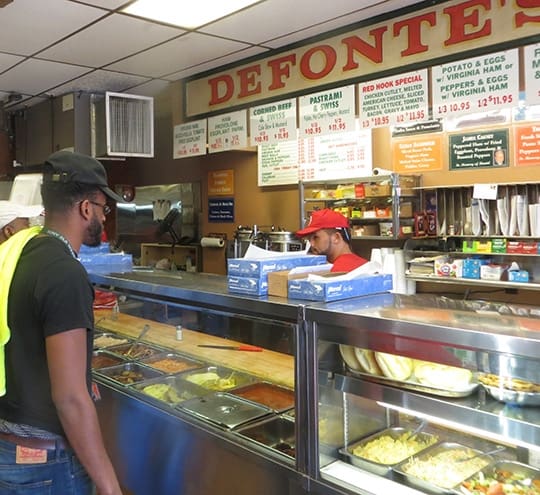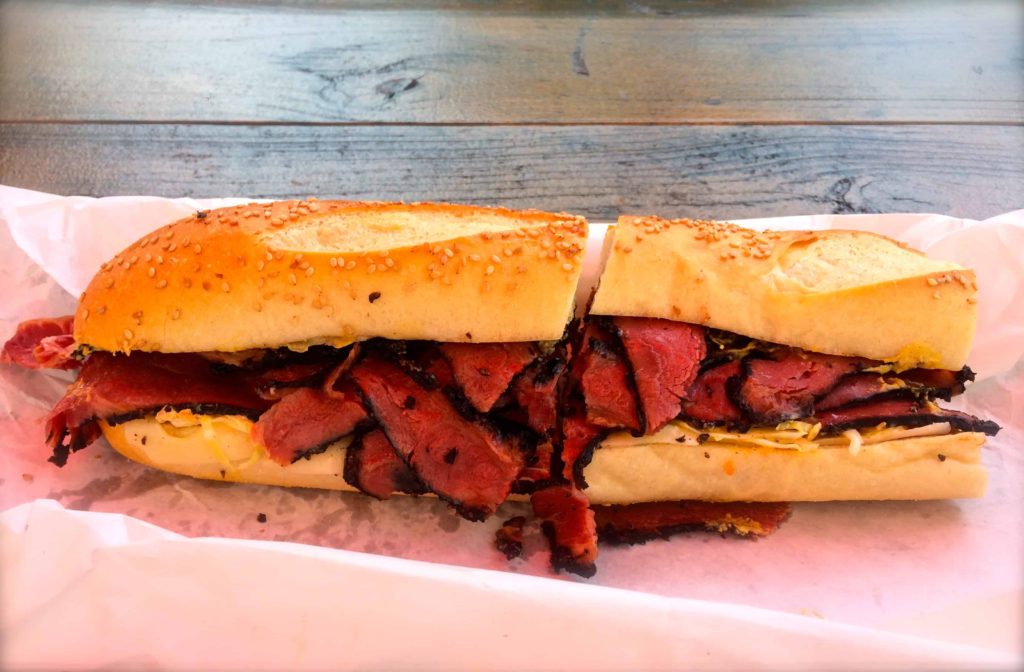
I’m hungry, but I dutifully wait for lunch. Because lunch is at Defonte’s.
I spend the morning writing at the Star-Revue’s warehouse office, pretending coffee is enough. The hours slouch by. When I can’t take any more typing, I bolt out the door and head down Van Brunt Street. Armed with a notebook and cash, I try my best to walk—don’t run, Sarah—toward the famed sandwiches.
The sun is brutal. Beads of sweat shine from the balding scalps of passing men. I alternate the sides of the street to find moments of shade. My shin-length black capris don’t help; I’d decided against shorts this morning, like I usually do when planning to walk around Red Hook, because the length of my pants determines how many unwelcome shout-outs I get from men. But today’s discomfort makes the walk feel more like a pilgrimage.
This is my first-ever trip to Defonte’s Sandwich Shop, the family-run legend that has served up hearty heroes since 1922. I’ve heard its praises sung all over—from New York Times food critic Sam Sifton’s love letter to Defonte’s fried eggplant sandwich, to my editor, George Fiala, claiming that the only reason why the shop survived decades of mob-ridden Red Hook was because no one wanted to lose such a great place for lunch. (With no research to confirm, I’ll let this lore linger for now.)
As my 20s march on, I’ve gained a “to hell with it” attitude about food and have become an omnivore foodie. If a fellow diner gapes at a portion and says, “That’s too big,” I’m often the one who takes up her fork and goes, “Challenge accepted.” So I’m ready for my meaty hero.
After a sweaty mile, I turn right onto Delavan Street. My eyes settle on Defonte’s at exactly 12:00 pm, which feels like something out of a movie. The red, white, and green of the thin building’s façade calls back to the Mediterranean motherland. Bold block letters above the doorway spell out the eatery’s name.
Welcome air conditioning awaits me on the other side of the glass door, along with a shop full of men. Or mostly men—whether this has to do with the shop’s old-school vibe, its history of serving workers of male-dominated sectors like longshoring and law enforcement, or the social notion that meaty meals are inherently masculine, my expectations are confirmed. I see one woman behind the counter and only a couple women ordering during today’s busy lunch hour.
The vibe is bright and bustling. Every other person walking through the door knows someone who’s already inside. I don’t know exactly where to order and am sure my hesitation outs me as a noob. A bunch of us customers bump up against the counter, eyeing the drool-inducing metal bins of plump olives and cheese slices on the other side of the glass.
A small army of red caps and collared shirts swarms in sandwich-making mode. I finally grab someone’s attention, unsure whether I’m in line.
“Can I have one of the specials—the corned beef one, please?” Having the voice of a shy eight-year-old, I make an effort to speak up above the din.
The shop’s layout is longer than it is wide, which accentuates the deli counter. The floor plan is made for momentum—no chairs in sight. I stand in a throng of hungry customers, shifting weight from leg to leg. I know I’m supposed to be talking to people, but shoving a notebook under someone’s nose moments before they pay for lunch seems rude and inconvenient. Feeling intimidated, I procrastinate and admire framed photos of beaming customers on the wall. The Sopranos’ James Gandolfini stares back.
When my sandwich is ready, the guy who took my order catches my attention by thrusting the brown paper bag in the air, like an Olympic torch at the opening ceremony.
I tell him that I am a reporter for the Red Hook Star-Revue and am writing up a little scene study on…and realize the time spent speaking this sentence has been longer than it took him to engineer my hero.
When’s your busiest time, do you think? I ask while paying. Uh, now, he says kindly, obviously wanting to help the next customer. He hands me the grease-smudged brown paper bag; it feels like there’s a brick inside.
Still awkward, I clutch my sandwich and Snapple in one hand with my notebook in the other. I can feel my backpack taking up precious customer space as the floor fills up. I plod over to the back near the kitchen and interrupt a three-way conversation as meekly as I can.
It’s clear I’m not going to get much out of this trio, but I do learn that the man in the middle is named Larry (later I realize he’s Larry Demonte, who’s worked at the shop since his teens).
“Every day is different,” says Larry with a wide smile, responding to my dull question about business hours. His bright white teeth blaze next to his a deep tan. The men flanking him smirk and try to figure me out.
Everyone from cops to sanitation workers comes in, adds Larry. “Sometimes the line’s out the door,” says the man to Larry’s right, eating. “I got turned away!” says the man to Larry’s left.
Next I sidle up to a duo who are eating over a small slice of counter space. The more talkative one, a Bay Ridge man named Julio, makes the trips to Defonte’s with his old childhood friend, Vincent, about twice a week. “We come all the way out here to have lunch,” says Julio. Vincent nods.
“We get a lot of truck drivers coming out,” Julio adds, graciously giving me notes to write down.
Vincent gives Julio a one-armed hug and calls him his first gay lover. They banter in between bites. When I turn to leave, Vincent tells me he’s just kidding, that he’s not gay. I smile, start to laugh, then stop, confused. They continue lunch.
I notice that most of the men in the shop are in pairs. I come up to another dyad of dudes waiting for their food at the register. “Could I ask you a few questions for the local paper?”
“Oh no, I’m okay!” a man gently waves me off. His friend doesn’t engage with me either, just stares. That’s okay. I want to eat my hero.
 The meal
The meal
I step outside into the sloppy heat and find a row of shaded picnic tables. I sit nearest the street. Two tables over, a pair of men sit mid-meal, eating in a silence. I’m too shy to interrupt what must be a religious experience. So I give myself a break and finally unwrap my sandwich.
Out tumbles thin pink slabs of corned beef, glassy with grease. Is it possible for meat to melt in your mouth? Because it just did. So succulent, the beef tricks the tongue with a flavor like butter. One bite could send a vegetarian spiraling into self-doubt.
On the hero’s first floor is a thin slice of Swiss, then slaw, then the meat (more than I’d eaten in a week), then mustard, all between the doughy parentheses of sesame-freckled Italian bread whose first crunch of crust reveals softer texture beneath. The mustard is an interesting surprise; the slight tang counters all the salt. Whenever the miracle meat tumbles out, I shovel the scraps into my mouth with my fingers like cavewoman.
Not having a napkin handy when devouring a Defonte’s hero is like locking yourself out of the house—you’re in trouble. Sans napkin, I employ the substitution method, alternating between my black capris and the edges of unused notebook paper. Thankfully, my magenta shirt has a stain that pre-dates this meal. I feel like a monster. I’m glad this isn’t a date.
The notes I’ve taken in between holding my sandwich are near illegible, my script more like small cave paintings than actual words. Eventually I give up my pen. I power through half my sandwich until I need a halftime break (just a break, I assure myself, unwilling to accept defeat).
My eyes wander back to the table where the two men quietly eat. They’ve been watching me, too, probably wondering why I was eating alone, feverishly writing in some sort of diary in between bites, and being gross about not having a napkin. But when they crumple up their sandwich wrappers, I approach.
One is Nelson, a middle-aged man who hails from Staten Island but was raised and born in Sunset Park. Nelson says he’s patronized Defonte’s since the 80s, eating here any chance he gets. In the area on a contracting job today, he stopped in for a roast beef, egg, and parm’ hero.
“There hasn’t been a moment that I never enjoyed my sandwich,” says Nelson, his white sandwich wrapper crumbled up like a map of conquered territory.
Nelson just inducted what seems like his young coworker, Charlie, to the Defonte’s experience. “I think it’s amazing,” says Charlie, a first-timer like me. “I got the Red Hook special.” (That’s chicken cutlet, American cheese, turkey, bacon, lettuce, tomato, gravy mayo.)
“I’d say it’s better than John’s Deli,” Charlie continues. “That’s the one I used to brag about.”
Nelson interjects: “He says he won’t go to Subway no more!”
We say good-bye as they clean up and lumber toward the street. Charlie squints in the ruthless sun and lights a cigarette. I immediately want one, too, maybe even a cigar–even though I don’t smoke.
Larry walks by. “You enjoying your food?” He’s still grinning at me, amused. I say something forgettable in return; my mind is warped by the stellar sandwich. Another pair of men turn me down for a quick interview, but I don’t care. I eat the whole damn hero and text a friend about it.
I feel manly, like I need to spit sideways to fit in here. I wish more women had gotten lunch that day—maybe they would’ve been easier to chat up? I immediately miss my eaten sandwich and can’t bring myself to take any more notes—a process so against the sensual pleasure of feeling carbs and protein spread through my stomach. I’ll have to come back for the potato and eggs.
If my walk to Defonte’s was hastened by appetite, I walk back in a state of sluggish satisfaction. My mind drifts to the office couch…do I deserve a nap now? Back in the office, co-workers ask: Which sandwich did you get? as if the hearty heroes are celebrities themselves. That said, I’ve just digested a new theory: perhaps the real heroes might be the aces behind the counter, the ones who shape the famous sammies with hard-working hands.








